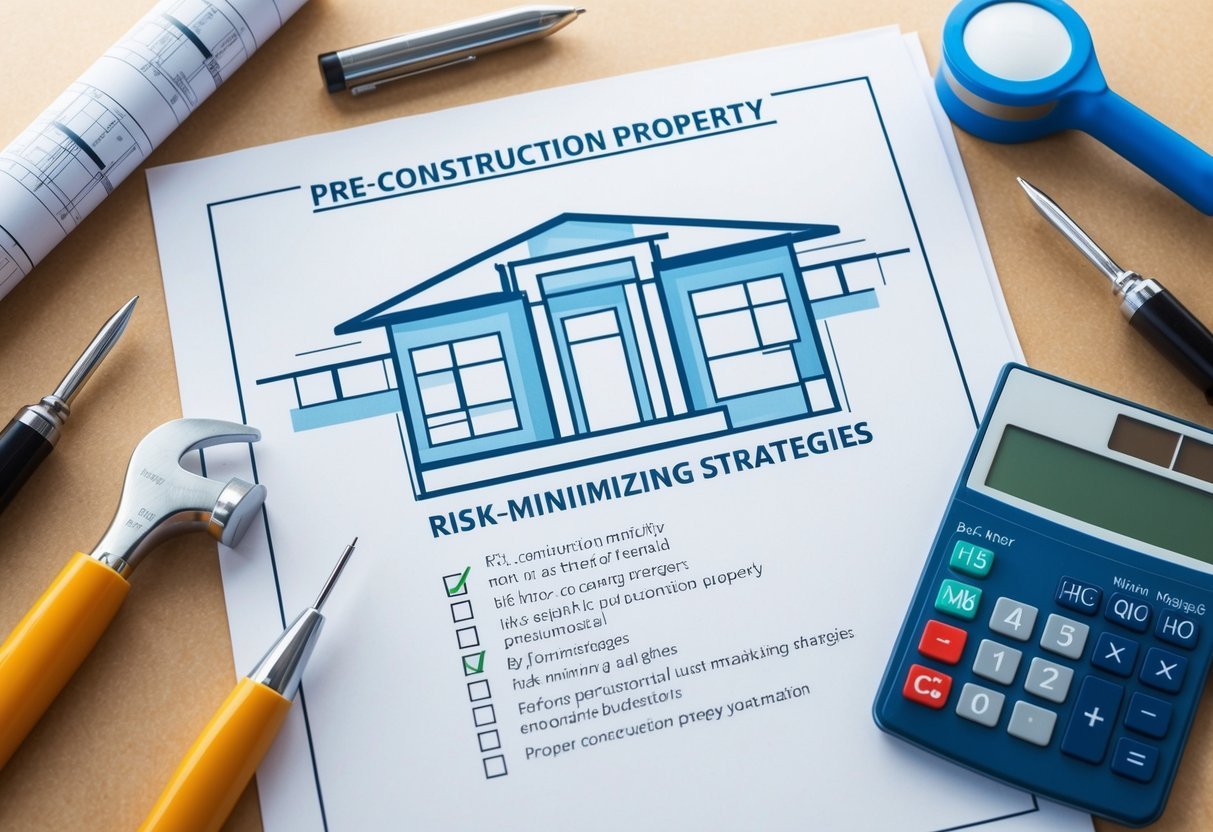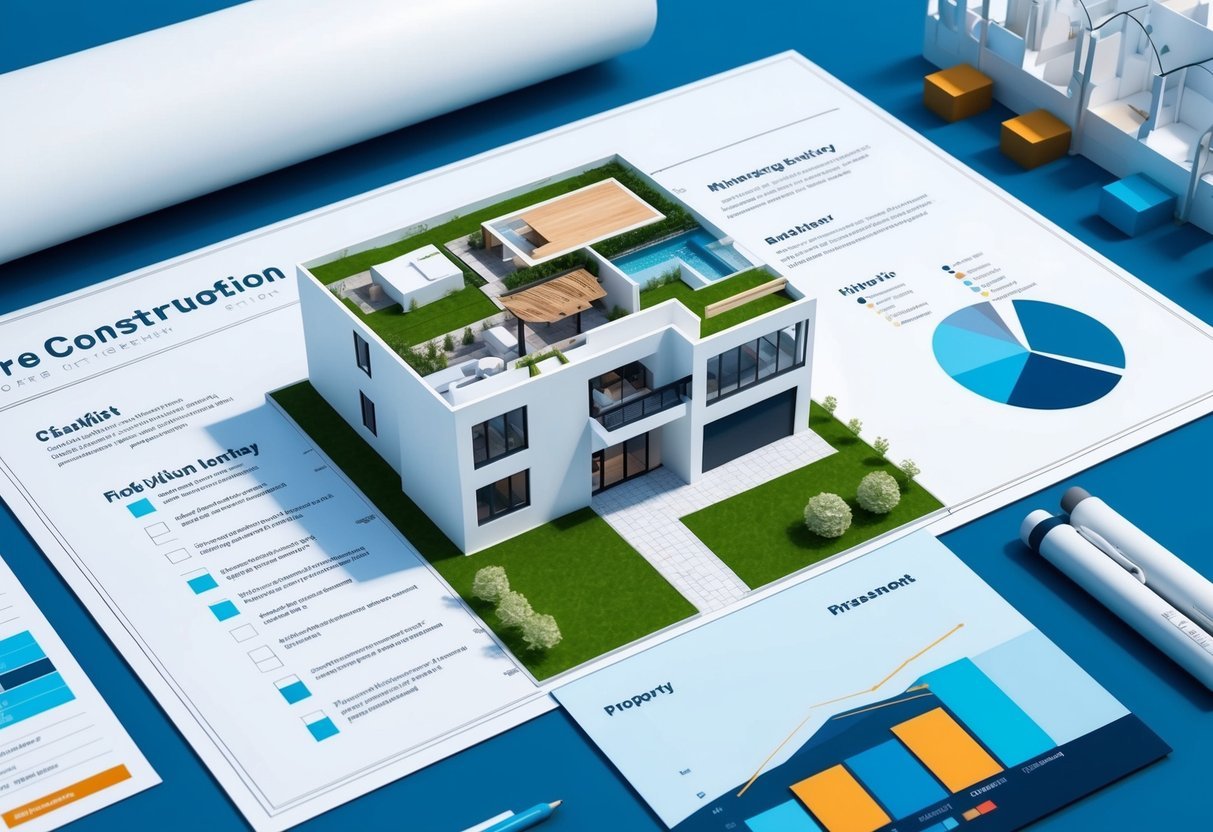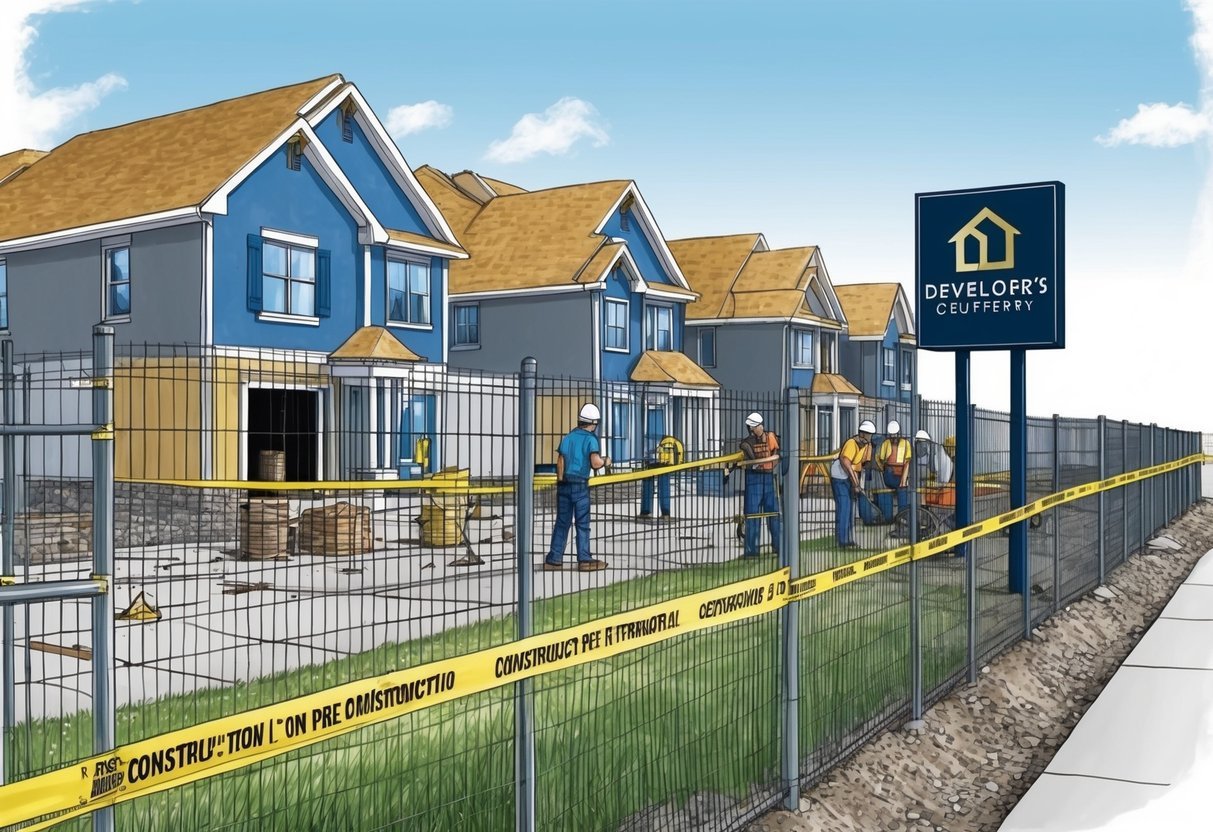Investing in pre-construction properties can be an appealing strategy for diversifying our real estate portfolios.
This opportunity allows us to enter projects at the ground floor, potentially leading to lucrative returns as the development progresses.
By carefully considering various factors, we can position ourselves for success in this dynamic market.

The key to thriving in pre-construction investments lies in effectively minimizing associated risks. Our aim is to explore strategic approaches that safeguard our interests and maximize potential benefits.
Understanding the landscape of these investments enables us to make informed decisions, ensuring that our ventures are both secure and profitable.
Conduct Thorough Market Research

Before investing in pre-construction properties, we must prioritize conducting comprehensive market research.
This step allows us to gain insights into economic trends, population growth, and development plans in the area.
By analyzing this information, we can better understand the potential demand and future value of the property.
We should also examine the historical performance of real estate in the area.
By looking at past property values, rental yields, and market fluctuations, we can gauge the investment’s potential stability and profitability.
Understanding these patterns helps us make more informed decisions.
Examining demographics is crucial.
Identifying the target market and ensuring there is sufficient demand for new properties can mitigate risks.
We need to consider factors like age distribution, income levels, and employment opportunities, which greatly influence housing demand.
Assessing the competition is another key aspect of market research.
We should identify existing and upcoming properties in the area to understand the competitive landscape.
Knowing our competitors enables us to evaluate how our investment might perform in the current market.
Staying informed about infrastructure developments and zoning changes gives us a comprehensive view of the area’s growth potential.
New transport links, schools, and amenities can significantly increase a property’s value, making them important factors in our decision-making process.
Consulting local real estate agents and market analysts can provide valuable insights.
Their expertise often highlights nuances of the local market that might otherwise go unnoticed.
Combining their knowledge with our research strengthens our investment strategy.
This proactive approach ensures we’re making well-informed decisions in the pre-construction investment landscape.
2) Choose Reputable Developers
When investing in pre-construction properties, selecting a reputable developer is crucial for minimizing risk and ensuring the project’s success.
We should start by evaluating the developer’s track record.
It’s important to look into their history of completed projects and verify that they were delivered on time and as promised.
Successful past developments can indicate reliability.
Examining a developer’s financial stability is also essential.
A financially sound developer is more likely to carry through with the project even in the face of economic challenges.
We can request financial statements or reports that provide insights into their fiscal health and capability to manage risks effectively.
Another important factor is the developer’s reputation in the market.
We should seek reviews or testimonials from previous clients and industry insiders.
These provide insights into the developer’s credibility and how they handle customer relations.
Positive feedback can serve as an assurance of quality and professionalism.
Communication with developers is also key.
It’s vital to gauge how transparent and approachable they are.
Open communication about timelines, budgets, and project milestones helps build trust.
Developers who are upfront about potential issues generally inspire more confidence.
Additionally, we can consider the developer’s partnerships and associations within the industry.
Collaborations with well-known architects or construction companies might reflect their commitment to quality.
A developer with strong alliances is often in a better position to deliver a successful project as planned.
3) Review Contracts Carefully
When investing in pre-construction properties, one of the most critical steps is to review contracts meticulously.
Contracts in real estate transactions can be complex, and pre-construction deals are no exception.
It’s essential to examine every clause to ensure that our interests are fully protected.
We should pay close attention to any clauses regarding potential design or layout changes.
Developers often retain the right to make modifications, so it’s vital to understand what alterations might occur and how they could impact our investment.
Additionally, it’s crucial to scrutinize terms related to project timelines.
Delays are not uncommon in construction, and knowing how these are handled contractually can prevent future disputes.
Understanding cancellation policies also prepares us for unexpected scenarios.
Engaging legal expertise is advisable.
A real estate attorney can help interpret contract language, ensuring that we comprehend each clause’s implications.
With professional guidance, we can negotiate terms that better align with our investment goals.
Furthermore, we should ensure the contract includes clear exit strategies.
This means understanding any fees or penalties associated with withdrawing from the deal if circumstances change.
Knowing our options provides financial flexibility.
Finally, including a comprehensive list of included finishes and features can protect us from discrepancies between what was promised and what is delivered.
Verifying these details ensures we make informed decisions based on the final product we expect to receive.
4) Secure Financing Early

Securing financing early is crucial when investing in pre-construction properties.
By getting financing in place before the project starts, we can take advantage of opportunities and avoid potential delays.
Early financial arrangements help us lock in favorable interest rates.
Having a clear understanding of our financial situation allows us to make informed decisions.
This preparation enhances our negotiation power with lenders.
It’s wise to explore various financing options, such as owner equity, loans, or home equity lines of credit.
Understanding these options can offer flexibility and potentially better terms.
Staying proactive about securing financing also helps us identify any additional financial resources that may be necessary.
Early financing readiness sets a solid foundation for our investment strategy.
Inspect the Property Regularly

Investing in pre-construction properties requires careful monitoring to ensure progress aligns with plans.
We must schedule regular visits to the construction site to personally verify that the work is on track and meets the necessary quality standards.
During these visits, it is crucial to communicate with the construction team.
This interaction allows us to address any concerns promptly, ensuring that potential issues are identified and resolved quickly.
Our goal is to maintain transparency in the construction process.
Site inspections also provide us with the opportunity to assess safety regulations.
By checking that all safety measures are correctly followed, we can prevent accidents and ensure the property is completed according to industry standards.
Our active involvement helps in identifying any deviations early.
Documentation during each inspection is important.
We should take notes and photographs, capturing the current progress and any areas that need attention.
This record-keeping helps us track developments and can be valuable if disputes arise later on.
Additionally, having a trusted expert accompany us can offer a professional perspective.
An experienced eye might catch details that we could overlook, providing us with further assurance of the property’s quality and safety.
Understanding Pre-Construction Property Investment

In our pursuit of investment opportunities, pre-construction properties present a unique landscape characterized by potential financial benefits and specific risk factors.
Recognizing these elements helps us make informed decisions.
What Is Pre-Construction Property?
Pre-construction property refers to real estate that is purchased before construction is completed.
Essentially, we buy into a project based on architectural plans and commitments from developers.
These purchases often involve agreements that outline build plans, timelines, and payment structures.
The attraction comes from the opportunity to buy at a potentially lower price, with the property often appreciating in value by the time construction is completed.
This type of investment is distinct from buying existing real estate, and it’s crucial for us to thoroughly review all contractual elements before proceeding.
Why Invest in Pre-Construction Properties?
We invest in pre-construction properties due to the potential financial benefits such as lower upfront costs and the possibility of price appreciation.
The initial investment is generally smaller compared to purchasing a completed property, which may appeal to those of us with limited capital.
Additionally, specific jurisdictions may offer tax benefits for such investments, further enhancing their attractiveness.
Engaging with experienced developers with proven track records can mitigate risks such as construction delays and market fluctuations.
We can diversify by investing across multiple projects in different markets, further reducing potential downsides.
Evaluating Market Trends and Location

When investing in pre-construction properties, it’s critical to pay attention to both market trends and the location.
Understanding these factors can significantly impact the long-term success of our investments.
Researching Market Trends
In the ever-changing real estate market, staying updated with market trends is vital.
We must regularly monitor supply and demand, which greatly influences property values and rental rates.
Studying these trends helps us predict future shifts, enabling more strategic decisions.
Utilizing various tools and resources can enhance our research.
We might leverage online platforms, consult industry reports, and attend real estate seminars.
Engaging with real estate professionals can also provide insights into local market dynamics and future developments.
Data analysis plays a crucial role here.
Analyzing historical data, such as past sales and pricing patterns, allows us to identify emerging trends.
This thorough understanding of market trends enables us to forecast potential opportunities and risks.
Taking proactive steps based on well-researched forecasts prepares us to navigate market fluctuations more effectively.
Choosing the Right Location
Selecting the optimal location is another key consideration when investing in pre-construction properties.
The location’s potential for growth and its current infrastructure should be examined meticulously.
Areas with ongoing or planned improvements, such as new transport links or amenities, often promise higher returns.
We must assess local economic conditions as well.
Employment rates, average income levels, and community growth trends are vital indicators of a location’s viability.
Proximity to essential services, such as schools, hospitals, and shopping centers, can also enhance a property’s attractiveness to potential buyers or renters.
Engaging with local experts or real estate agents familiar with the region can provide deeper insights.
Their knowledge can guide us in selecting locations with the highest potential for appreciation.
Prioritizing safety and community engagement adds another layer of appeal and security to our investments.
Assessing the Developer’s Reputation

Evaluating the developer’s background plays a crucial role in minimizing risks when investing in pre-construction properties.
We need to focus on examining their past project achievements and verifying their financial conditions.
Reviewing Past Projects
Examining the developer’s previous projects gives us valuable insights into their capabilities.
We should assess several factors, such as the quality of construction, adherence to timelines, and customer satisfaction.
Tracking records of projects completed on time and within budget typically indicate a reliable developer.
It’s also beneficial to visit completed properties in person, if possible, or speak with occupants to understand their experiences.
Positive reviews and a history of successful projects enhance our confidence in the developer’s reputation and reliability.
Such due diligence can highlight any recurring issues in their past developments.
Checking Financial Stability
A developer’s financial health directly impacts the success and timely completion of projects.
We should scrutinize their financial statements, including balance sheets and cash flow statements, if available.
It’s wise to inquire about their funding sources, such as bank loans or private investors, to assess their financial reserves.
Understanding these aspects helps us determine if they can handle unforeseen challenges that may arise during construction.
Engaging with industry experts or financial analysts can also provide deeper insights into the developer’s fiscal security.
Financial stability ensures that the project proceeds without delays and reduces the risk of potential financial pitfalls.
Frequently Asked Questions

When investing in pre-construction properties, we need to implement strategies to minimize risks.
This involves careful financial planning, understanding market dynamics, and ensuring we have protective measures in place.
What strategies can investors use to reduce potential losses in pre-construction property investment?
We recommend conducting thorough market research to identify high-potential areas and opting for reputable developers known for reliability.
Regular property inspections during construction phases can help track project progress and identify issues early.
What are the key considerations for due diligence before investing in pre-construction projects?
Due diligence involves reviewing contracts meticulously, understanding all terms, and being aware of any potential penalties.
We should also investigate the developer’s track record, ensuring they have successfully completed past projects.
What financial measures should be taken to safeguard against pre-construction investment volatilities?
Securing financing early can lock in favorable terms and rates.
We also advise setting aside contingency funds to cover unforeseen expenses or delays.
Regularly reviewing our financial position and adjusting plans as necessary is also wise.
How do market conditions affect the risk of pre-construction property investments and how can investors respond?
Fluctuating market conditions can impact property values and demand.
We can respond by keeping abreast of economic trends and adjusting investment strategies accordingly.
It’s crucial to sell or hold investments based on current and predicted market scenarios.
What insurance or guarantee options are available for mitigating investment risks in pre-construction real estate?
Investors can explore insurance options like construction insurance, which protects against specific construction-related risks.
Developers might offer guarantees, ensuring project completion or buy-back options, providing us with a safety net.
In what ways can diversification play a role in minimizing the risk involved with pre-construction property investments?
Diversification involves spreading investments across various properties or locations to mitigate risks.
We can reduce the impact of market fluctuations on our overall portfolio returns by investing in different types of properties.

